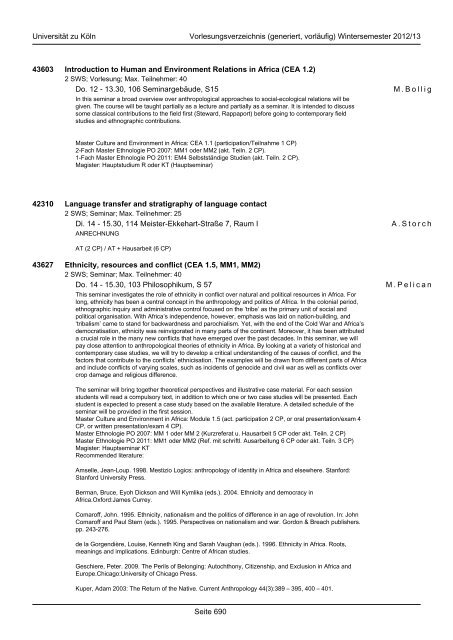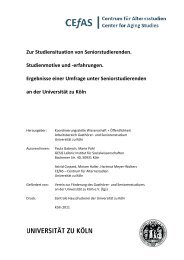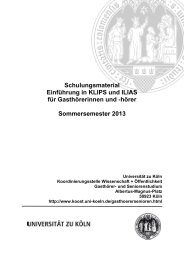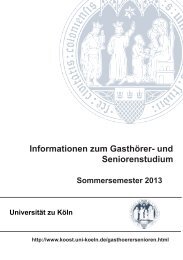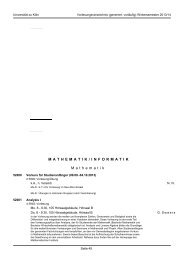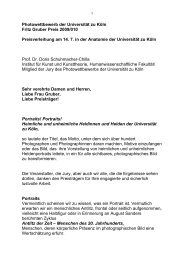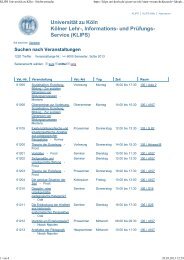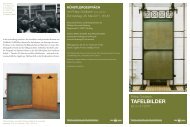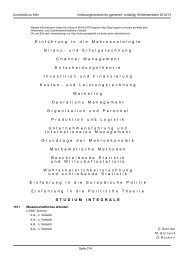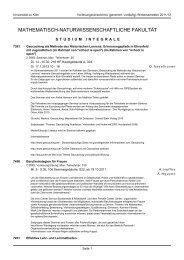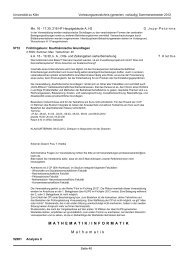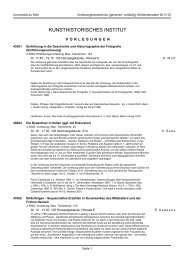Studium Integrale - koost - Universität zu Köln
Studium Integrale - koost - Universität zu Köln
Studium Integrale - koost - Universität zu Köln
Erfolgreiche ePaper selbst erstellen
Machen Sie aus Ihren PDF Publikationen ein blätterbares Flipbook mit unserer einzigartigen Google optimierten e-Paper Software.
<strong>Universität</strong> <strong>zu</strong> <strong>Köln</strong> Vorlesungsverzeichnis (generiert, vorläufig) Wintersemester 2012/13<br />
43603 Introduction to Human and Environment Relations in Africa (CEA 1.2)<br />
2 SWS; Vorlesung; Max. Teilnehmer: 40<br />
Do. 12 - 13.30, 106 Seminargebäude, S15 M.Bollig<br />
In this seminar a broad overview over anthropological approaches to social-ecological relations will be<br />
given. The course will be taught partially as a lecture and partially as a seminar. It is intended to discuss<br />
some classical contributions to the field first (Steward, Rappaport) before going to contemporary field<br />
studies and ethnographic contributions.<br />
Master Culture and Environment in Africa: CEA 1.1 (participation/Teilnahme 1 CP)<br />
2-Fach Master Ethnologie PO 2007: MM1 oder MM2 (akt. Teiln. 2 CP).<br />
1-Fach Master Ethnologie PO 2011: EM4 Selbstständige Studien (akt. Teiln. 2 CP).<br />
Magister: Hauptstudium R oder KT (Hauptseminar)<br />
42310 Language transfer and stratigraphy of language contact<br />
2 SWS; Seminar; Max. Teilnehmer: 25<br />
Di. 14 - 15.30, 114 Meister-Ekkehart-Straße 7, Raum I A.Storch<br />
ANRECHNUNG<br />
AT (2 CP) / AT + Hausarbeit (6 CP)<br />
43627 Ethnicity, resources and conflict (CEA 1.5, MM1, MM2)<br />
2 SWS; Seminar; Max. Teilnehmer: 40<br />
Do. 14 - 15.30, 103 Philosophikum, S 57 M.Pelican<br />
This seminar investigates the role of ethnicity in conflict over natural and political resources in Africa. For<br />
long, ethnicity has been a central concept in the anthropology and politics of Africa. In the colonial period,<br />
ethnographic inquiry and administrative control focused on the ‘tribe’ as the primary unit of social and<br />
political organisation. With Africa’s independence, however, emphasis was laid on nation-building, and<br />
‘tribalism’ came to stand for backwardness and parochialism. Yet, with the end of the Cold War and Africa’s<br />
democratisation, ethnicity was reinvigorated in many parts of the continent. Moreover, it has been attributed<br />
a crucial role in the many new conflicts that have emerged over the past decades. In this seminar, we will<br />
pay close attention to anthropological theories of ethnicity in Africa. By looking at a variety of historical and<br />
contemporary case studies, we will try to develop a critical understanding of the causes of conflict, and the<br />
factors that contribute to the conflicts’ ethnicisation. The examples will be drawn from different parts of Africa<br />
and include conflicts of varying scales, such as incidents of genocide and civil war as well as conflicts over<br />
crop damage and religious difference.<br />
The seminar will bring together theoretical perspectives and illustrative case material. For each session<br />
students will read a compulsory text, in addition to which one or two case studies will be presented. Each<br />
student is expected to present a case study based on the available literature. A detailed schedule of the<br />
seminar will be provided in the first session.<br />
Master Culture and Environment in Africa: Module 1.5 (act. participation 2 CP, or oral presentation/exam 4<br />
CP, or written presentation/exam 4 CP).<br />
Master Ethnologie PO 2007: MM 1 oder MM 2 (Kurzreferat u. Hausarbeit 5 CP oder akt. Teiln. 2 CP)<br />
Master Ethnologie PO 2011: MM1 oder MM2 (Ref. mit schriftl. Ausarbeitung 6 CP oder akt. Teiln. 3 CP)<br />
Magister: Hauptseminar KT<br />
Recommended literature:<br />
Amselle, Jean-Loup. 1998. Mestizio Logics: anthropology of identity in Africa and elsewhere. Stanford:<br />
Stanford University Press.<br />
Berman, Bruce, Eyoh Dickson and Will Kymlika (eds.). 2004. Ethnicity and democracy in<br />
Africa.Oxford:James Currey.<br />
Comaroff, John. 1995. Ethnicity, nationalism and the politics of difference in an age of revolution. In: John<br />
Comaroff and Paul Stern (eds.). 1995. Perspectives on nationalism and war. Gordon & Breach publishers.<br />
pp. 243-276.<br />
de la Gorgendière, Louise, Kenneth King and Sarah Vaughan (eds.). 1996. Ethnicity in Africa. Roots,<br />
meanings and implications. Edinburgh: Centre of African studies.<br />
Geschiere, Peter. 2009. The Perils of Belonging: Autochthony, Citizenship, and Exclusion in Africa and<br />
Europe.Chicago:University of Chicago Press.<br />
Kuper, Adam 2003: The Return of the Native. Current Anthropology 44(3):389 – 395, 400 – 401.<br />
Seite 690


